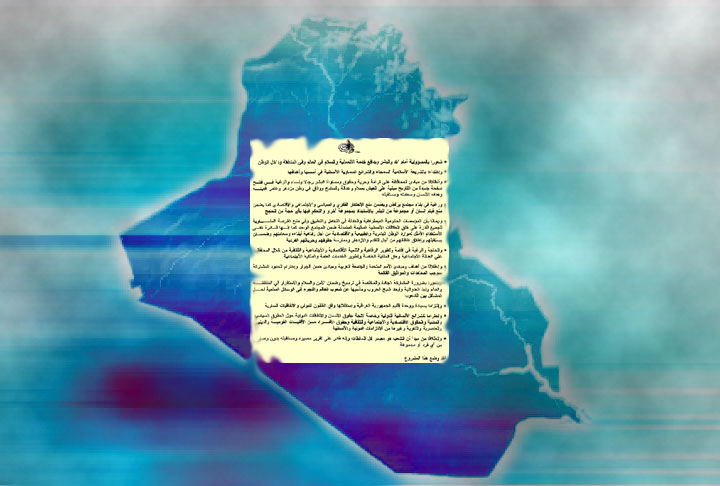{ Islam from inside }

Iraq's Provisional Constitution
Added March 11, 2004Iraq's provisional constitution is set to go into effect on June 30,
2004. There's already an excess of coverage and discussion on the
news
and on the net, and lawyers and "experts" are busy publicly dissecting
the intent, direction, limitations, and scope of its various articles.
The full text of the constitution can be found here and it's
something that all those interested in the future of Iraq should take
the time to read.
The constitution is a 'system of fundamental laws and principles
that prescribes the
nature, functions, and limits of a government' - as such it is a
crucial,
critical
document that sets the tone and the limits of future governance. There
is
to be an annex to the constitution that will be added on to the
existing text before the
June 30th implementation date - which highlights the fact that there
are still issues to
be resolved and continuing active disagreements and concerns among the
drafters and ratifiers of the constitution. Beginnings are pivotal
moments and one can only hope that Iraq enters into it's new phase with
a solid, agreed upon foundation that puts to rest the apprehensions of
those who fear inequality, disenfranchisement, or the inability to
script their own future.
Once the document enters into force, various factions and groups will
interpret and stretch and test the limits of
the constitutional framework. Loopholes, partisan legal
interpretations, and leveraging of influence are a common part of any
system and various special
interest groups will continue to seek to subvert or use any given
system for
their own ends. No document can legislate for all such circumstances -
nor should any document be so rigid as to not allow for a legitimate
flexibility in interpretation and execution - it's striking the right
balance that's difficult. A
constitution has a "spirit" and intention as well as a hard
legal reality. The implementation, realization, and preservation of the
vision behind the legal clauses is a task carried out and overseen by
human beings - and its effectiveness is tied to the ethics, character,
intentions, and aims of the people in positions of power within the
governing system. (Saddam's Iraq had many "pretty" and noble sounding
clauses ensconced in it's constitution - but as the brutality of the
past decades have
shown, words (spirit) and reality can be
two entirely different worlds). Constitutions place theoretical legal
limits on
abuse, but influential people determined to "work" the system can
nevertheless do
tremendous and lasting damage.
When a people accept a constitution they are accepting and embracing
the vision of its intention and spirit - its principles. Perfection is
not expected, but sincerity toward the principles is. The sincerity and
effort of those in authority (and the restraint of those acting as
power brokers behind the scenes) is key if there is to be an effective
emergence of the "character", however imperfect, contained within the
charter.
Transition periods such as the one Iraq is going through are precarious
and hazardous moments, precisely because so much is at stake for so
many parties - so many varied interests, so many ambitions, are in play
both inside and outside Iraq. Fear and desire run at a
fever pitch in such times. Inshallah Iraqi's will find their own stable
balance point in the midst of their many difficulties.
"The best of affairs is the middlemost."
Governance
Imam Ali's letter of advice to
Malik al-Ashtar is a classic document
on the ethics of governing and the duties of those in positions of
authority. It's a document that anyone in a position of authority could
learn from. The complete letter can be found here. What follows is a
small excerpt.
"Know, O Malik, that I am sending you to a land where governments, just
and unjust, have existed before you. People will look upon your affairs
in the same way that you were wont to look upon the affairs of the
rulers before you. They will speak about you as you were wont to speak
about those rulers. And the righteous are only known by that which God
causes to pass concerning them on the tongues of His servants. So let
the dearest of your treasuries be the treasury of righteous
action....Infuse your heart with mercy, love and kindness for your
subjects. Be not in face of them voracious... counting them as
easy prey, for they are of two kinds: either they are your brothers in
religion or your equals in creation. Error catches them unaware,
deficiencies overcome them, (harmful deeds) are committed by them
intentionally and by mistake. So grant them your pardon and your
forgiveness to the same extent that you hope God will grant you His
pardon and His forgiveness....
Beware of blood and spilling it unlawfully, for nothing is more deserving of vengeance (from God), greater in its consequence or more likely to (bring about) a cessation of blessing and the cutting off of (one's appointed) term than shedding blood unjustly. God - glory be to Him - on the Day of Resurrection will begin judgment among His servants over the blood they have spilt. So never strengthen your rule by shedding unlawful blood, for that is among the factors which weaken and enfeeble it, nay, which overthrow and transfer it. You have no excuse before God and before me for intentional killing, for in that there is bodily retaliation......"
(from Imam Ali's letter of advice
to Malik al-Ashtar)
